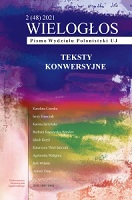Słuchanie kerygmatu: Martin Heidegger i Nowa Hermeneutyka. Dwa wstępne rozpoznania
Hearing the Kerygma: Martin Heidegger and the New Hermeneutics. Two Preliminary Findings
Author(s): Jakub KorylSubject(s): Philosophy of Language, Hermeneutics
Published by: Wydawnictwo Uniwersytetu Jagiellońskiego
Keywords: Martin Heidegger; Gerhard Ebeling; Ernst Fuchs; hermeneutics; Lutheranism; proclamation; theory of language; word-event;
Summary/Abstract: This paper aims to set a foreground that will further reveal the theological and hermeneutical standpoint of Ernst Fuchs and Gerhard Ebeling. The author argues that some of their basic ideas and concepts, such as human being (Dasein), questionableness (Fraglichkeit), thrownness (Geworfenheit) or language-event (Sprachereignis), owed their origin to Martin Heidegger, but none of them could be considered a mere faded copy of their Heideggerian counterparts. New Hermeneutics were engaged in a theological verification and transposition (rather than accommodation) of Heidegger pursuing his aim of overcoming metaphysics. As a theory of language of faith and verified fundamental ontology, Lutheran hermeneutics deliberately avoided the question of “What does the biblical text actually mean?” or even “What does the text mean to me?” Instead, it took great pains to persist in asking “Why should the biblical text mean anything?” To grasp the supreme importance of this question, the author makes two preliminary observations: on the boredom with language and on radical questionableness or passivity of Dasein. In the section of the article concerning the boredom with language, the author discusses the reasons that prevent man from encountering the Word of God which does not stand for something thus transcending itself, but rather exercises its questioning and transformative power. For it is the Word of God which reveals itself as a biblical skandalon or the obstacle and threshold for Dasein. Instead of reassuring man in his self-understanding, such Word constantly calls human independence and agency into question. For that reason, replacing one language with another is no longer the major challenge. Instead, it is a kerygmatic interpretation of language aimed at restoring man’s intimacy with language as his genuine place of being. It is only a short step from here to disclosing the radical questionableness, that is a state of man becoming a question to himself. As an experience that calls the autonomy of human self into question, radical questionableness involves a divine question to which manmade reality never provides an answer that could be considered definitive, although all the provided answers remain binding. Consequently, such experience reveals a historical and passive path of human being before the divine Word, a path which violates metaphysical constitution of subjectivity and therefore transforms the purpose of proclamation and the meaning of kerygma. As a call and challenge to man, or an answer given by the wholly other God to the question concerning man, kerygma makes Dasein finally capable of entering a relationship with the Word which does not violate divine sovereignty. For it is kerygma that brings the ecstatic nature of man to the fore. Kerygma establishes a speaking-hearing interplay of God and man and makes hearing the basic form of man’s being before God. Such relationship consists therefore in nothing but a responsible acceptance of a gift, that is hearing the divine Word.
Journal: Wielogłos
- Issue Year: 2021
- Issue No: 48
- Page Range: 87-113
- Page Count: 27
- Language: Polish

